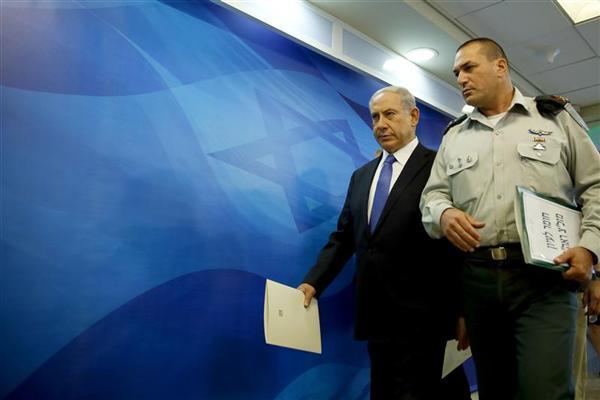Israeli PM feeling push from the right and his own party to embark on military campaign against Hamas
With the situation in the Middle East escalating on a daily basis, Prime Minister Benjamin Netanyahu finds himself under renewed pressure from Israel’s right to send his troops into Gaza for a full-scale ground invasion against Hamas. But any potential campaign will be fraught with difficulties, none more so than how victory would be defined.
The most vocal critic at the moment is Foreign Minister Avigdor Lieberman, whose right-wing nationalist party Yisrael Beitenu dissolved his merger with Netanyahu’s Likud party this week. It was a symbolic break more than anything — the outspoken politician will remain in government — but the moment encapsulates the increasing pressure on Netanyahu to deploy troops in Gaza.
Lieberman, 56, announced that he would break his political alliance with Netanyahu, formed prior to the last election, because there are “substantial” differences between the two leaders — with the most notable one being how to deal with the Islamist militant group Hamas, which rules Gaza.
Following rocket fire this week, Lieberman again called for a military operation that would hit Hamas hard, preferably for him including a ground invasion. He has previously called for Israel to occupy the territory permanently.
“A situation in which a terrorist group has hundreds of rockets which it can decide any moment to use is intolerable,” he said yesterday. “There have been suggestions that we wait … but I don’t know what we’re waiting for.”
Lieberman is not the only one asking for immediate action. Another government minister, Naftali Bennett, the leader of right-wing party Habayit Hayehudi, has called on Netanyahu to escalate the country’s military response, amid fears Hamas is growing too strong.
Netanyahu even faces pressure from inside his own conservative party. Minister of Strategic Affairs Yuval Steinitz has said that occupying Gaza is Israel’s only option if it wants to secures its future.
Former IDF chief Amos Yadlin has also stated that Israel should “neutralize” the threat of Hamas “through a broad military move.”
In recent days, Netanyahu has seemed less keen on a full-scale military operation, despite declaring that “Hamas will pay” last week when the bodies of the three Israeli teenagers were found murdered.
There are many complications for the Israeli PM to consider: any offensive is bound to cause casualties on both sides, significantly more on the Palestinian one, and would likely cost large amounts of money.
Complications
There are many complications for the Israeli PM to consider: any offensive is bound to cause casualties on both sides, significantly more on the Palestinian one, and would likely cost large amounts of money. Deaths in Gaza are likely to be met with international outcry — people are guaranteed to be caught in the crossfire, leading to the deaths of more innocent civilians. This may mean any ground offensive would be short-lived.
The military says the current offensive, “Operation Protective Edge,” will “retrieve stability for the residents of southern Israel,” but such a goal is vague. When would Israel decide this has been achieved? After Hamas’ military infrastructure has been damaged? When Hamas has been wiped out?
Even if Israel were to attempt to eliminate Hamas entirely, it would probably then face taking over the running of Gaza and looking after its citizens permanently.
As for a de-escalation, this seems even more unlikely, especially with rockets heading into Israel from Gaza, airstrikes in response and troops being called up by Jerusalem. Airstrikes therefore are likely to continue until the rockets from Hamas cease. If they don’t, Netanyahu may find himself siding with the hawks and authorising a ground offensive.
International leaders over the past few days have called for calm. Even locally, there is pressure not to act — the mayors of 14 Jewish and Arab towns in the Galilee, a region of northern Israel that overlaps with Haifa, called yesterday on Israelis to “maintain calm and normality.”
Barack Obama also added his voice to calls for restraint yesterday. Writing in the Israeli newspaper Haaretz, the US president said that the region was facing a “dangerous moment,” indicating growing concern in Washington over the tense situation. In his comments, which were printed in Hebrew, Arabic and English, Obama said he was heartbroken by the senseless violence over the past week — referring to the horrible deaths of three Israeli teenagers and the killing of a 16-year-old Palestinian in revenge.
The US president, disappointed at the failure of US-led peace talks which collapsed last year, again tried to push negotiations yesterday, saying his country was ready to sit down with both sides, whenever there was “the political will” to do so.
Obama also took time to praise the under-fire Mahmoud Abbas, saying that in the Palestinian president, “Israel has a counterpart committed to a two-state solution and security cooperation with Israel.” There was no praise however for Netanyahu.
The frosty relationship between the two is said to be at a new low since the failure of the peace talks. Netanyahu’s demand that the Palestinians recognise Israel as “a Jewish state,” was seen as throwing a spanner in the works, with many questioning Israel’s commitment.
With hopes for peace currently extinguished, Obama now finds himself calling for calm, yet backing Israel’s right to defend himself.
Netanyahu, for his part, has pledged “to do whatever is necessary” to ensure the security of his countrymen. How far he goes in Gaza remains to been seen, but with forces massing outside the territory, the only sure outcome looks like more deaths — on both sides.
@urlgoeshere
Originally published in the Buenos Aires Herald, on Wednesday, July 9, 2014
Link: http://www.buenosairesherald.com/article/164137/hardliners-help-netanyahu-find-war-footing.

